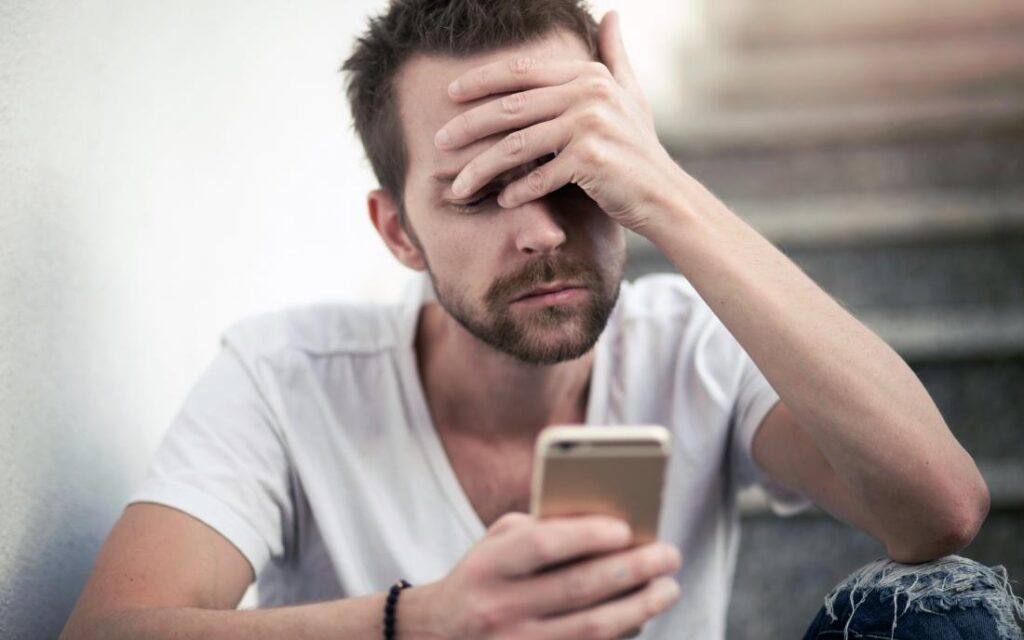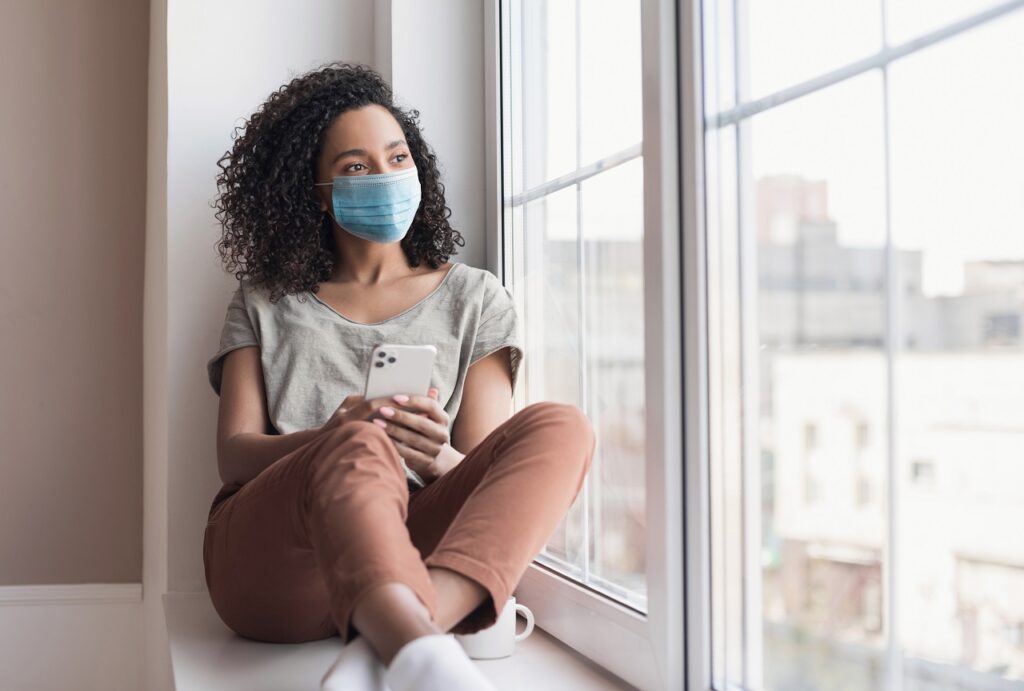5 Ways To Deal With Pandemic-Induced Anxiety

It’s been almost two years, but it seems like a lot of time has passed since COVID-19 emerged, and many people have suffered from pandemic-induced anxiety because of it. Many find it challenging and life-altering because the new “normal” imposed many abrupt changes. While most people have come to accept the new norm, others have a hard time adjusting mentally and emotionally.
Anxiety In The Pandemic
One of the many mental health issues that people experience during the pandemic is anxiety. While it’s a normal reaction to harmful and uncertain events, it becomes unhealthy when it is not addressed. Many people have been suffering from anxiety due to the pandemic as a result of fewer social activities, less personal communication, and the constant worry of getting infected.
Governments have implemented social restrictions to prevent the spread of the virus, requiring everyone to stay at home. This may keep people safe from contracting the virus, but it also means less interaction and outdoor quality time.
Social events, hobbies, finances, work, and school have changed drastically. People are now required to work and study at home; social events have been canceled or limited. Thus, people became more anxious than ever.
Too much anxiety may lead to panic attacks and self-harm which takes a toll on your overall health. Some people even overstock medical and essential supplies in fear of going out and contracting the virus. Others overuse alcohol, sanitizers and overclean their surroundings to keep viruses at bay.
While these may be seen as preventative, other anxious people tend to refuse or deny that the situation is serious. The constant worry, stress, and anxiety could easily lead to a nervous breakdown if professional help and medication are not sought.
Symptoms of Anxiety
If you think you’re suffering from pandemic-induced anxiety, there are symptoms you can watch out for. These symptoms may affect your actions and thoughts, such as the following:
- Physical Symptoms: Difficulty swallowing, sweating, shakiness, inability to concentrate, and racing heart. They may not be dangerous in the short term, but they’ll feel horrible. And when you often experience such symptoms a little more longer than usual, it may be a more serious form of anxiety.
- Other Symptoms: Overfocusing on the news, helplessness, sense of impending doom, and rumination. Others may not like to hear news about it, so they hide or avoid knowing what’s in the news at all. Impatience, irritability, spacing out, and feeling tense are also part of anxiety symptoms. All of which can affect your way of living: either you overdo things or don’t get things done.
How Can You Deal With Pandemic-Induced Anxiety?
If you are experiencing the symptoms mentioned above, it may be best to start dealing with your anxiety head-on. Treat it seriously, so you can prevent it from worsening. Since the pandemic is not gone and may last for more months, it may be best to consider the following ways when dealing with anxiety during this pandemic:
1. Seek Professional Guidance Or Treatment

Letting your mental state worsen before asking for professional help is not the best way to go. The earlier you seek professional help, the better you can deal with your mental and emotional state properly. Talking to someone can manage your anxiety, especially if you’re talking to a mental health professional. If you need to reach out to a mental health professional, you can check out this website now.
You may think that an increase in irritability, changes in appetite, and difficulty sleeping may be normal reactions to the current situation. However, these signs may become overbearing. Thus, talking to a professional about mental health issues can help you de-stress. You can speak to them about the following situations that may worsen or cause anxiety:
- You Feel Worthless: Since staying home is the new norm, you may be glued to your social media accounts. Then, you may be seeing some friends having the best version of their lives; you may see them physically beautiful, not stressed, relaxing, and the like. Overdoing this may cause you to question yourself and make you feel insecure. When you talk to a psychologist, you can better understand yourself, your gift, and what you can do more to make your situation better. You may feel better about yourself and may even stop comparing yourself to other people.
- You’re Grieving: If you have a loved one who died during the pandemic, you may feel isolated. While this may be normal, you still need support throughout the grieving process. If you don’t feel like sharing with your loved ones, a professional can give you the support you need. You can talk about your feelings, your story, and your grief without worrying about criticisms or judgments.
- You Think COVID-19 Is A Big Change: This is true for everyone, but if you feel it is overbearing, talking to a psychologist may help. They may help you navigate the situation and talk over your options.
- You Need An Objective Viewpoint: You may be able to talk and share your thoughts with your friends or family, but it’s quite different when doing so with a professional. Sessions are focused more on you so you can better understand your thoughts. Moreover, professionals will not depend on personal feelings when they give their viewpoints. Their expertise, knowledge, and experience may help your overall mental health condition.
- You Have An Underlying Mental Health Issue: Most importantly, you may need therapy with professionals if you have an underlying mental health condition. By doing so, you can receive the right treatment. When you have professional guidance or treatment, you can better equip yourself to survive the new norm.
2. Avoid Obsessively Checking The News

Staying informed during this time is vital as it can help you navigate the current situation better. It enables you to be updated on new regulations that your state may impose. This will help you stay updated and be able to follow the latest health protocols and regulations.
However, obsessively checking the news may lead you to malicious sites or news feeds circulating wrong information. Seeing sensationalized news may also cause you to become more fearful.
That’s why you may need to check your sources before you read or watch. It’s best to unfollow unfamiliar sites, social media pages, and others that may feed you with the wrong content. Instead, stick to trustworthy sources such as your local public health authority, the World Health Organization (WHO), and legitimate news networks.
It’s also best to avoid checking for updates more often. Rather than easing you about the pandemic, constant monitoring of social media feeds or news may fuel your anxiety. It may result in counterproductive or compulsive actions, which may not be healthy.
Be aware when you’re doing this so that you can stop or limit yourself. If you feel like you’re becoming more anxious after checking the news, you may want to limit your daily news consumption to 10 to 15 minutes a day.
If possible, you can cut off yourself from all news sources and just ask your loved ones about important updates. Just make sure that your loved ones can also be relied on to deliver accurate news. That way, you can avoid social media entirely and prevent your anxiety levels from spiking up.
3. Focus On What You’re Grateful For

Since the pandemic has brought life-changing events, don’t focus on them. Avoid thinking about your canceled travels, change in routine, and the like. Instead, check your blessings and focus on them.
For instance, you may be grateful for having to stay home with your family. No more long-distance calls to your kids in college if they’re with you. You may want to make up for the lost times when you’re too busy working; use this pandemic to spend more time with them.
If you’re working from home, value it because many people may have lost their jobs because of the pandemic. Instead, you may want to be grateful for having work despite staying home more than ever.
You can also find new hobbies and target new goals that you can perform each day. This includes gardening, doodling, painting, knitting, or crafting. These simple activities can help keep off your mind from worries. You can also try playing games or watching your favorite shows.
By focusing on the good stuff, you may be able to build resiliency. You can prevent focusing on negative thoughts and potential threats that the limbic brain is focused on. Choosing to look at the positive things can make a difference when living in an uncertain and challenging situation.
4. Take Time To Exercise

Aside from safeguarding your mental health, you also need to mind your physical health. You can do so by regularly exercising—even at home. You may want to do vigorous-intensity or moderate-intensity physical activity each week. Even 15 minutes a day of exercise may help curb anxiety hormones.
When you engage in physical activities, you can prevent anxiety from worsening because of the following:
- You can build resilience against stormy emotions.
- You increase your endocannabinoids, brain-derived neurotrophic factor, gamma-aminobutyric acid, and serotonin. All of which are anti-anxiety neurochemicals.
- Exercising can release dopamine or serotonin. These neurotransmitters are well known to reduce the spur of anxiety.
- You may lower your body’s contribution to anxiety by decreasing muscle tension.
- You can divert from anxious situations when you’re focused on exercising.
Here’s how you can improve your physical health at home:
- Avoid Sitting Down All Day: It’s recommended to stand up every 30 minutes, especially when working at home. You may engage in simple activities like standing up for ten minutes while working to lessen your sedentary time.
- Walk: If your local authorities allow you to park or engage in physical activities, take advantage of this and walk to the park. Or you can simply walk around your backyard or inside your home if you’re still restricted from going out.
- Follow Online Exercises: Many health enthusiasts and influencers offer free online exercise videos. Check them out and do the most suitable for you. Or buy an online exercise class to force yourself to become physically active at home. That way, you’ll not feel like you’re wasting your money if you attend such courses.
5. Feed Your Body With Healthy Foods

Most importantly, you should nourish your body with healthy foods. Don’t let the pandemic disrupt your healthy diet. Instead, take this opportunity to build a healthy meal plan for your family.
Since your family members may have different tastes and food preferences, you can learn to make various recipes. Avoid filling your shelves with unhealthy snacks. Instead, you may want to consider doing these tips to make good food choices mindfully:
- Avoid stressful meal preparation by setting a schedule. It’s predictable, so you know when to prepare your food in time for your family’s daily meal.
- While filling your pantry with healthy foods is important, it’s also recommended to have weekly or occasional comfort food. Pick a day to enjoy these comfort foods to ensure that you won’t spend all your days eating them.
- Choose edible berries or citrus foods instead of flavored drinks. Skip on sugary juices and soda.
- Ensure to load up your shelves with lean proteins, healthy fats, whole grains, vegetables, and fruits.
- Avoid buying starchy, processed, or sugary snacks.
- Use internet resources to find amazing food recipes. You can also engage in FaceTime, Zoom, or Skype to stay connected with friends or family when preparing a meal.
Absorbing the proper nutrients for your body can boost your immune system. When you boost your immune system, you’re also preventing your chances of being infected by the virus. Thus, you don’t only have one benefit from eating healthy foods, but you’re getting a dual effect.
Conclusion
It’s normal to become stressed and anxious during the pandemic because the situation is new to many. A lot of people are still adjusting to the new normal and navigating the new way of performing day-to-day transactions. However, too much anxiety can be dangerous as well. Instead of protecting yourself, you may be risking your mental and emotional health. Gear yourself and consider the ways mentioned above to reduce or deal with pandemic-induced anxiety.




